|
|
|
Sort Order |
|
|
|
Items / Page
|
|
|
|
|
|
|
| Srl | Item |
| 1 |
ID:
193594
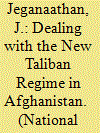

|
|
|
|
|
| Summary/Abstract |
The absence of a democratically elected government, the poor state of law and order and the many restrictions and violations of basic rights, especially those of women, under Taliban rule in Afghanistan are developments of deep concern. Moreover, the increasing tension along the Durand line with Pakistan, and the challenge posed by the Islamic State-Khorasan to the Taliban have made the security situation precarious. This paper examines the emerging strategic and security trends in Afghanistan in the post-Taliban takeover period. Should India engage with the Taliban regime so that it can influence its decisions, provide aid to its needy, and limit the security impact for the region, especially on Jammu and Kashmir? What would be the fallout if the Taliban regime is recognised and its relationship with the international community is formalised?
|
|
|
|
|
|
|
|
|
|
|
|
|
|
|
|
| 2 |
ID:
193590
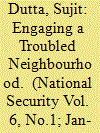

|
|
|
| 3 |
ID:
193595
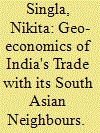

|
|
|
|
|
| Summary/Abstract |
India’s global ambitions are intricately linked to its growth as a leading nation as well as its regional influence. Brimming with opportunity yet equally troubled by challenges deep-rooted in its vast expanses, history and extra-regional geopolitics, cooperation in South Asia has proved to be a predicament as unique as the region itself. It is argued that South Asia’s performance in terms of socioeconomic indicators depends to a large extent on India’s geo-economics, and hence, this essay focuses on the use of trade policy in the geo-economics of India with its neighbours. On one hand, trade and investment figures indicate India’s position as the gravitational core in South Asia has weakened. On the other hand, it is doing more than ever under the aegis of the “Neighbourhood First” and the “Act East” policy to strengthen connectivity infrastructure at the sub-regional level, given the sombre achievements of the SAARC region as a whole in strengthening regional economic ties. The essay makes pointed recommendations for effective regionalism amongst the South Asian nations.
|
|
|
|
|
|
|
|
|
|
|
|
|
|
|
|
| 4 |
ID:
193592
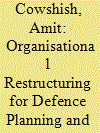

|
|
|
|
|
| Summary/Abstract |
The enduring asymmetry between India’s military capabilities vis-à-vis its adversaries is a matter of concern. The widely held view that it is largely because of the politico-bureaucratic apathy, which manifests itself in the continuing absence of a National Security Strategy (NSS) as the basis for defence planning and inadequate budgetary allocations, needs revaluation. The situation has not changed despite the government having set up a high-level Defence Planning Committee (DPC) in 2018 to inter alia draft the NSS. The budgetary allocations also continue to fall short of the requirement projected by the armed forces. This paper broadly explores these two issues and argues that there is a need to consider the desirability of setting up a 24x7 Defence Planning Board for financially viable defence planning and a bespoke Defence Capability Acquisition Organisation, both of which have been recommended in the past by committees constituted by the Ministry of Defence itself.
|
|
|
|
|
|
|
|
|
|
|
|
|
|
|
|
| 5 |
ID:
193593
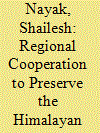

|
|
|
|
|
| Summary/Abstract |
The Himalaya is a unique ecological system and millions of people depend on its rivers for water, food and energy. It has distinctive biodiversity with a variety of high altitude vascular plants, grasslands, birds, etc. The Himalaya is under stress due to natural hazards such as earthquakes, landslides, floods, glacial lake outburst floods, climate change impacts such as the retreat of glaciers, and changes in precipitation patterns. Besides, anthropogenic activities related to infrastructure development, urbanisation, tourism, etc., also affect the Himalayan system. Defencerelated activities by China, Pakistan and India have placed additional pressure on the Himalayan ecology. The geological, cryospheric, hydrological and atmospheric processes and their interaction need to be modeled for the preservation of the Himalayan ecosystem. The formation of the Himalayan Science Council (HSC) is a positive step but it needs to set up monitoring systems for observing/measuring geological, hydrological, cryospheric, atmospheric and biological phenomena. Collaboration between research institutes of the Himalayan nations is a critical necessit
|
|
|
|
|
|
|
|
|
|
|
|
|
|
|
|
| 6 |
ID:
193591
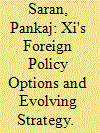

|
|
|
|
|
| Summary/Abstract |
China has always been a difficult society to understand because of its opaque, secretive
and authoritarian political system, and insights into its functioning and what drives
its behaviour are still far from definitive. Ensuring an accurate understanding of China
is a task of the greatest consequence for India. This requires the marshalling of all our
intellectual, intelligence and strategic resources and expanding our skill set. The stakes
involved are such that we need an authentic Indian perspective on China. We cannot
see China through the eyes of others. We have a rich body of expertise on China based
on the collective experience of our serving and retired diplomats as well as the expanding
study of China in our academic institutions and the growing body of Indian students in
China. This represents a large and invaluable resource.
|
|
|
|
|
|
|
|
|
|
|
|
|
|
|
|
|
|
|
|
|